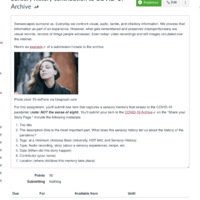Item
The Sound of Silence
Media
Title (Dublin Core)
The Sound of Silence
Description (Dublin Core)
The experience I am sharing focuses on my sense of hearing. Work has shifted away from office buildings and into our homes and, as a result, downtown urban areas emptied. This was especially true in mid-May of 2020. The one time I was in my city's downtown, it was uncomfortably quiet, and the negative reaction I had in the moment caught me off guard. Covid19 put me in a constant state of anxiety, and this is one more example of how seemingly small differences in a familiar environment can turn us upside down.
In the summer of 2020, I wrapped up a seven-year stint as a resident of Tucson, Arizona. It is a small city in the Southwest of the United States primarily known for delicious food, beautiful monsoon storms, and unbearably hot temperatures. Most of my time in the city was lovely. Sweaty, but still enjoyable. With Covid19 and its effects, my last few months as a Tucsonan were different. Some changes were expected, but it was an auditory experience that stands out. I heard, standing at an intersection in the middle of downtown Tucson, absolutely nothing. For the first time in months, I went beyond the two-block radius of my apartment and grocery store to the heart of the city, surrounded by silence. My ears should have been filled with a steady buzz of sound. Various car engines, revving and idling together usually form a rumble in the background. A cacophony of music—from the beats of the rooftop club that inexplicably plays at all hours of the day, to the slices of radio escaping into the air as people come and go from businesses—ought to be tumbling together with conversations and footsteps. Clattering dishes and the slosh of icy drinks in plastic cups usually tie it all together. You see, cities are nothing if not loud. But Tucson was quiet. The absence of sound where I had known nothing but noise was unsettling. It actively affected my behavior. I could, and did, trace the route of the few cars that drove by even as they turned out of sight. Each sound of my boots hitting the sidewalk echoed around the intersection and I softened my footsteps in response. An occasional breeze made the flyers announcing Covid19 measures and shutdown notices rustle in a way alarmingly similar to the opening scene of an apocalyptic horror movie. Because the typical background sounds of the city were missing, every small noise was conspicuous, uncomfortable, and even threatening. The low-level, but consistent, fear for my safety I had been feeling for months because of the pandemic spiked to a point that day, triggered by sound. In most other situations I love silence. I can work, and even drive long distances, with no music in the background. I camp and hike as an escape into the quiet of nature. All those city sounds I described can be incredibly overwhelming. Knowing this, my reaction in the moment was inexplicable. However, with the benefit of perspective, I am connecting my discomfort to a bigger problem of how accustomed we are to noise pollution in our lives. When the city picks up speed again and noise returns to downtown urban areas, will our ears thank us? Or will this lead to changes in policy surrounding one of the most underrated aspects of our lives? I find myself hoping it does.
Date (Dublin Core)
Creator (Dublin Core)
Contributor (Dublin Core)
Event Identifier (Dublin Core)
Partner (Dublin Core)
Type (Dublin Core)
text story
Controlled Vocabulary (Dublin Core)
Curator's Tags (Omeka Classic)
Contributor's Tags (a true folksonomy) (Friend of a Friend)
Linked Data (Dublin Core)
Date Submitted (Dublin Core)
1/15/2021
Date Modified (Dublin Core)
1/20/2021
1/26/2021
2/2/2021
This item was submitted on January 15, 2021 by Corinna Obermayr using the form “Share Your Story” on the site “A Journal of the Plague Year”: http://www.covid-19archive.org/s/archive
Click here to view the collected data.
